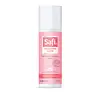What's inside
What's inside
 Key Ingredients
Key Ingredients

 Benefits
Benefits

 Concerns
Concerns

No concerns
 Ingredients Side-by-side
Ingredients Side-by-side

Water
Skin ConditioningBetaine
HumectantMethylpropanediol
SolventDipotassium Glycyrrhizate
HumectantGlycerin
HumectantDisodium EDTA
Allantoin
Skin ConditioningNiacinamide
SmoothingSodium Hyaluronate
HumectantBenzophenone-4
UV AbsorberAlpha-Glucan Oligosaccharide
CleansingSodium Hydroxide
BufferingPolymnia Sonchifolia Root Juice
Skin ConditioningAloe Barbadensis Leaf Extract
EmollientMaltodextrin
AbsorbentLactobacillus
Skin ConditioningPhenoxyethanol
PreservativeChlorphenesin
AntimicrobialWater, Betaine, Methylpropanediol, Dipotassium Glycyrrhizate, Glycerin, Disodium EDTA, Allantoin, Niacinamide, Sodium Hyaluronate, Benzophenone-4, Alpha-Glucan Oligosaccharide, Sodium Hydroxide, Polymnia Sonchifolia Root Juice, Aloe Barbadensis Leaf Extract, Maltodextrin, Lactobacillus, Phenoxyethanol, Chlorphenesin
Water
Skin ConditioningAlcohol Denat.
AntimicrobialButylene Glycol
HumectantSalicylic Acid
MaskingPEG-40 Hydrogenated Castor Oil
EmulsifyingSodium Hydroxide
BufferingParfum
MaskingAloe Barbadensis Leaf Extract
EmollientDisodium EDTA
Melaleuca Alternifolia Leaf Oil
AntioxidantPotassium Azeloyl Diglycinate
Skin ConditioningBenzophenone-4
UV AbsorberAnthemis Nobilis Flower Extract
MaskingEnantia Chlorantha Bark Extract
Skin ConditioningMenthol
MaskingOleanolic Acid
Skin ConditioningPhenoxyethanol
PreservativeCaprylyl Glycol
EmollientChlorphenesin
AntimicrobialWater, Alcohol Denat., Butylene Glycol, Salicylic Acid, PEG-40 Hydrogenated Castor Oil, Sodium Hydroxide, Parfum, Aloe Barbadensis Leaf Extract, Disodium EDTA, Melaleuca Alternifolia Leaf Oil, Potassium Azeloyl Diglycinate, Benzophenone-4, Anthemis Nobilis Flower Extract, Enantia Chlorantha Bark Extract, Menthol, Oleanolic Acid, Phenoxyethanol, Caprylyl Glycol, Chlorphenesin
 Reviews
Reviews

Ingredients Explained
These ingredients are found in both products.
Ingredients higher up in an ingredient list are typically present in a larger amount.
Aloe Barbadensis Leaf Extract is an extract of the leaves of the aloe, Aloe barbadensis, Liliaceae.
Aloe is one of the most well-known natural soothing ingredients, and for good reason. It’s full of water and has a cooling, calming effect on the skin, especially when it’s sunburned, itchy, or irritated. Aloe also helps your skin stay hydrated and smooth by mimicking what healthy skin naturally produces. On top of that, it contains vitamins and nutrients that support skin recovery.
It doesn’t protect you from the sun, but it can help your skin bounce back after too much time in it.
Let’s get into the details:
Aloe contains antioxidant Vitamins A, C, and E, which help fight off free radicals (unstable molecules from things like pollution that can damage your skin).
It’s also rich in polysaccharides, which are natural sugars that help hydrate the skin by acting like the skin’s own moisturizing agents. These, along with other sugars like monosaccharides, help form a protective barrier that locks in moisture.
Aloe works as both a humectant and an emollient. That means it draws water into the skin (humectant) and helps trap it there (emollient), making it an effective natural moisturizer.
You’ll also find a mix of other skin-supporting ingredients in aloe, including folic acid, choline, calcium, amino acids, fatty acids, and even Vitamin B12.
Out of the 420+ species of aloe, Aloe barbadensis is the most widely used in skincare products thanks to its gentle yet effective properties.
There are over 420 species of aloe but Aloe Barbadensis is the most commonly used for topical products.
Learn more about Aloe Barbadensis Leaf ExtractBenzophenone-4 is a water-soluble chemical sunscreen.
It protects in the UV-B range, but is considered a secondary UV absorber. This means that it needs to be paired with other sunscreen ingredients to provide effective protection.
Typically, it's used in cosmetic products to protect them from deterioration caused by UV rays. This is why you'll find it in a lot of products that aren't sunscreens.
Learn more about Benzophenone-4Chlorphenesin is a synthetic preservative. It helps protect a product against bacteria in order to extend shelf life. In most cases, Chlorphenesin is paired with other preservatives such as phenoxyethanol and caprylyl glycol.
Chlorphenesin is a biocide. This means it is able to help fight the microorganisms on our skin. It is also able to fight odor-releasing bacteria.
Chlorphenesin is soluble in both water and glycerin.
Studies show Chlorphenesin is easily absorbed by our skin. You should speak with a skincare professional if you have concerns about using Chlorphenesin.
Learn more about ChlorphenesinDisodium EDTA plays a role in making products more stable by aiding other preservatives.
It is a chelating agent, meaning it neutralizes metal ions that may be found in a product.
Disodium EDTA is a salt of edetic acid and is found to be safe in cosmetic ingredients.
Learn more about Disodium EDTAPhenoxyethanol is a preservative that has germicide, antimicrobial, and aromatic properties. Studies show that phenoxyethanol can prevent microbial growth. By itself, it has a scent that is similar to that of a rose.
It's often used in formulations along with Caprylyl Glycol to preserve the shelf life of products.
Sodium Hydroxide is also known as lye or caustic soda. It is used to adjust the pH of products; many ingredients require a specific pH to be effective.
In small amounts, sodium hydroxide is considered safe to use. However, large amounts may cause chemical burns due to its high alkaline.
Your skin has a natural pH and acid mantle. This acid mantle helps prevent harmful bacteria from breaking through. The acid mantle also helps keep your skin hydrated.
"Alkaline" refers to a high pH level. A low pH level would be considered acidic.
Learn more about Sodium HydroxideWater. It's the most common cosmetic ingredient of all. You'll usually see it at the top of ingredient lists, meaning that it makes up the largest part of the product.
So why is it so popular? Water most often acts as a solvent - this means that it helps dissolve other ingredients into the formulation.
You'll also recognize water as that liquid we all need to stay alive. If you see this, drink a glass of water. Stay hydrated!
Learn more about Water